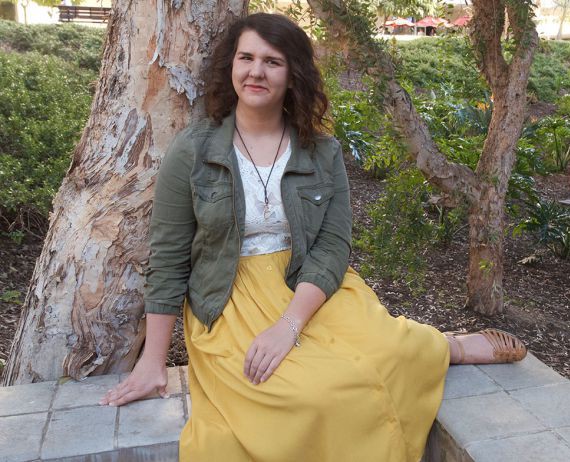
Speaking in Bahasa Indonesian, California State University, Dominguez Hills (CSUDH) alumna Kayleigh Davis said “Sampai jumpa lagi” (Until we meet again) as she left her friends whom she’d been visiting in Las Vegas.
When she got in her car for the long drive home to Los Alamitos, she turned on a language-learning audio tape to try to memorize more words and dialogue.
Davis (2014, B.A., interdisciplinary studies) believes she will have a good grasp of the language in two years when she returns from her time as an education Peace Corps volunteer teaching English in Indonesia. Accepted into the Peace Corps in December 2014, she will depart for the Southeast Asian country this March to begin her pre-service training.
“They’d like me to know about 100 words before I get there. I’m like ‘I’ll do 200,’ but that’s a bit ambitious and I may need to cut it back a bit,” said Davis. “I know about 30 words right now. I love the language so far. It’s very bouncy and it sounds almost musical when you speak it.”
There are approximately 110 Peace Corps volunteers in Indonesia working on education projects. Davis’ pre-service training will consist of living with a host family for three months, fully immersed in the Indonesian language and culture.
“Those poor souls during my first three months will have to put up with me not knowing anything, but they’ll help me through the transition and culture shock. Once my three months of training are done I’ll get my permanent host family that I’ll be with until the end of my service,” said Davis. “I also look forward to learning how to cook the local food from the families, and having someone to kill spiders for me when necessary.”
Davis graduated from CSUDH with a bachelor’s degree interdisciplinary studies with a emphasis on global studies, but began her college career on a much different path–as a business major–and will shift directions again to pursue a law degree when she returns from Indonesia.
“Interdisciplinary studies really taught me about people and my privileges in the world compared to other cultures,” she said. “In Indonesia I will approach how I interact with people inquisitively, and teach from a listening standpoint instead of trying to force my ideas. The Peace Corps asks us not to have expectations, so I’m trying to clear any perception of what I’ll be doing out of my head.”
Along with teaching and learning the culture, Davis looks forward to interacting with the people, many of who are misunderstood in the United States due to their religion, according to Davis.
“What’s unique about the Peace Corps in Indonesia is the government is really involved in developing our program because the country has put so much into its education system. They have a lot of schools and kids, but not a lot of teachers,” she said. “Something that also interests me is that Indonesia is 90 percent Muslim. In America we have a lot of issues in the way we view Islam, and these people are welcoming me into their homes, and I’m sure they will be loving and accepting of me. I’d really like to do my part in helping change the way they’re viewed in my country.”
A significant reason Davis choose the Peace Corps for service is that it focuses on helping people in ways that are sustainable. She also likes how the volunteerism is largely directed by the host countries.
“The Peace Corps does not go anywhere it is not requested. I’ll have my main assignment as an English teacher, which has been requested by Indonesia, and any other project I develop will be based on the expressed needs of the host community,” Davis explained. “By no means will I go and say ‘You have a problem and I’m going to fix it for you.’ I love that it’s about what the people need.”
Davis’ journey of service and helping others stems from a place in her past that was a bit darker than today. In the Peace Corps she hopes to continue to grow, both authentically and as a person.
“For a long time I felt like I was such a bad person, and a way that I could get fulfillment was through service. I eventually started to improve myself and the way that I felt about myself,” she said. “Now service isn’t really a selfish thing. Sure, I have always felt really good helping others, but now I learn and listen to people better. My goal is that while in Indonesia I provide compassionate and effective help that is as good for the people and it is for me.”
About the Peace Corps:
As the pre-eminent international service organization of the United States, the Peace Corps sends Americans abroad to tackle the most pressing needs of people around the world.
Peace Corps volunteers work at the grassroots level with local governments, schools, communities, small businesses and entrepreneurs to develop sustainable solutions that address challenges in education, health, economic development, agriculture, environment and youth development. When they return home, volunteers bring their knowledge and experiences – and a global outlook – back to the United States that enriches the lives of those around them.
President John F. Kennedy established the Peace Corps in 1961 to foster a better understanding among Americans and people of other countries. Since then, more than 215,000 Americans of all ages have served in 139 countries worldwide. Visit www.peacecorps.gov. to learn more.